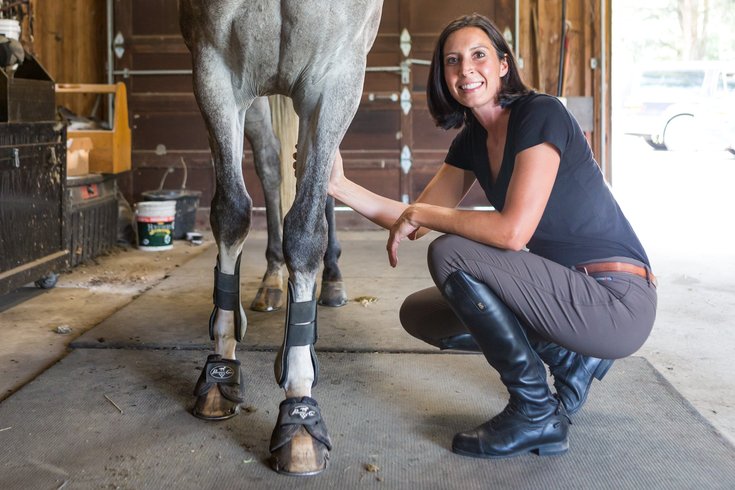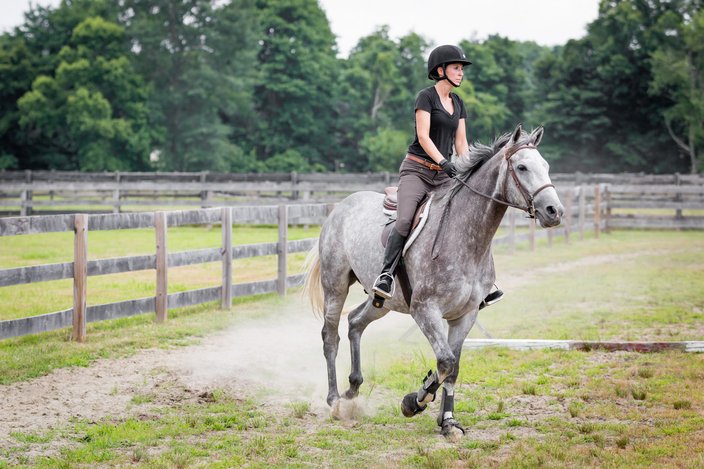
July 17, 2018
 Thom Carroll/PhillyVoice
Thom Carroll/PhillyVoice
Dr. Nicole Fox, a trauma surgeon at Cooper University Hospital, poses after grooming and tacking up her young thoroughbred, Phoenix.
After a long day at the hospital, nothing relaxes Dr. Nicole Fox more than spending time with her horses, a 5-year old thoroughbred named Phoenix and an Appaloosa named Romeo.
Riding since she was 7 years old, Fox knows the special relationship between horse and rider.
“Horses are amazing animals," she said. “Growing up, I loved learning how to communicate and form a relationship with them. It is very rewarding to be around them.”
Horses are also very therapeutic, able to bring some shy children out of their shells, she added.
Fox, 42, associate chief medical officer and medical director of pediatric trauma at Cooper University Hospital, rode throughout grade school and high school and sporadically during college, medical school and residency. During a three-year break between college and medical school, she took the opportunity to buy her first horse. It gave her the chance to ride every day.
“I love the relationship with the horses and all the physical work. People don’t realize how much physical labor is entailed when riding and taking care of horses,” she said. “I learned early the value of hard work, getting up early, setting goals and seeing them through to completion.”
In her early 20s she even trained for and showed in the New Jersey show circuit in the Hunter and Jumper divisions with her horse, Sweet Emotion. They even competed in the Devon Horse Show.
“...It takes a long time to develop a relationship with a horse. They have their own personalities and emotions. Like people, they have good days and bad days.”
At her horse farm in Lumberton, Fox has more time to ride and to just enjoy having the horses at home.
“It is a big difference between having your own farm and boarding your horses at a stable. You have control over the care of your horses, but it is a lot of work. You are responsible for cleaning the stalls, all the hands-on horse care, and coordinating vet and farrier visits.”
Fox has her hands full with her work at Cooper, her four kids (3½-year-old triplets and a 9-year-old), the horses, two dogs and four chickens. Luckily, she has her dad and her nanny to help with the horses and farm.
The surgeon's day starts around 5:30 or 6 in the morning, feeding the horses and letting them out. In the afternoon, the stalls get cleaned out. She tries to ride at least 3 days a week.
Dr. Nicole Fox does flat work with her 5-year-old thoroughbred, Phoenix, in the riding ring at her Lumberton home.
Fox sees a lot of parallels between horseback riding and medicine, including a need for excellent communication, empathy and discipline.
“You need to be committed to it. Both require working long days and odd hours, but it is rewarding,” she added.
Fox is no longer interested in competition, but is open to her kids competing some day. Right now she is happily training Phoenix.
“You need to realize that you will have a lot of ups and downs and it takes a long time to develop a relationship with a horse," Fox said. "They have their own personalities and emotions. Like people, they have good days and bad days.”
You can’t force a 1,500-pound animal to do what they don’t want to do, she added.
The same thing goes for riding for the first time. She said that while a lot of people want to try riding for their first time while on vacation, it a lot harder than they realize, learning how to get on and off the horse, how to sit properly and how to communicate with a horse.
“I always tell people interested in riding horses to not do it without any prior experience and training. You have to learn how to do it safely,” she said.
“Riding and handling horses can be dangerous," she advised. "As a trauma surgeon I have many patients who were injured after falling from horses or while handling them on the ground. Always take lessons and gain some experience at a local, reputable stable first.”

 Thom Carroll/PhillyVoice
Thom Carroll/PhillyVoice